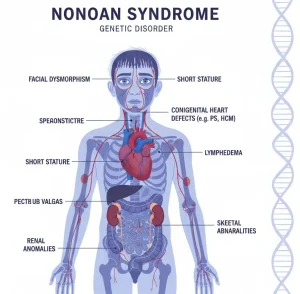Overview
Noonan syndrome is a genetic disorder that affects normal development in various parts of the body. It is characterized by distinctive facial features, short stature, heart defects, and other physical and developmental differences. Noonan syndrome can affect people of all genders and ethnic backgrounds and is often diagnosed in infancy or early childhood, though mild cases may be identified later in life.
Symptoms
Symptoms of Noonan syndrome vary widely in type and severity:
-
Distinctive facial features such as wide-set eyes, low-set ears, and a broad forehead
-
Short stature or delayed growth
-
Congenital heart defects, commonly involving heart valves or blood flow
-
Delayed puberty in adolescents
-
Chest shape abnormalities, such as a sunken or protruding chest
-
Learning difficulties or mild intellectual disability
-
Vision or hearing problems
-
Easy bruising or bleeding
Some individuals may have only mild features, while others experience more complex medical issues.
Causes
Noonan syndrome is caused by genetic mutations that affect cell signaling pathways involved in growth and development. These mutations interfere with normal cell regulation, leading to the characteristic features of the condition. The disorder is usually inherited in an autosomal dominant pattern, meaning only one altered gene is needed, though many cases result from a new mutation with no family history.
Risk Factors
The main risk factor for Noonan syndrome is genetic inheritance:
-
Having a parent with Noonan syndrome
-
Presence of a spontaneous genetic mutation during early development
The condition affects males and females equally and occurs across all populations.
Complications
Noonan syndrome may lead to various complications:
-
Serious heart conditions requiring long-term monitoring or surgery
-
Growth delays requiring hormonal treatment
-
Bleeding disorders
-
Fertility issues, particularly in males
-
Learning and behavioral challenges
-
Increased risk of certain blood disorders
Early medical care helps reduce the risk of long-term complications.
Prevention
Noonan syndrome cannot be prevented because it is a genetic condition. However, proactive management can improve outcomes:
-
Genetic counseling for affected individuals and families
-
Early diagnosis and regular medical monitoring
-
Timely treatment of heart and growth-related issues
-
Developmental support and educational interventions
Ongoing medical follow-up plays a key role in managing Noonan syndrome and supporting overall health and development.
Advertisement

